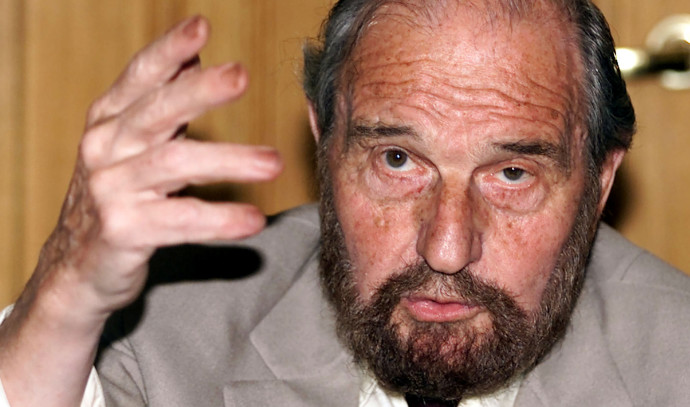British intelligence official George Blake, who was employed as a spy for the Soviet Union, was imprisoned in Britain and fled to Moscow, died today (Saturday) at the age of 98. Sergei Ivanov, a spokesman for the Russian intelligence agency SVR, said: “We have received unfortunate news. “The legendary Blake has passed away.”
Blake was born in the Netherlands in 1922 as George Bahr. His father was a Sephardic Jew who settled in Egypt and fought in the British army during the First World War and his mother was a Protestant Dutchman. His father died when he was 12 and Blake was sent to live with his uncle in Egypt. In Cairo he became acquainted through communist ideology through his cousin, Henri Kuriel. While visiting the Netherlands, World War II broke out and Blake was active in the Dutch underground during the Nazi occupation.
In 1942 Blake fled to Britain and joined the British Navy, where he was promoted to the rank of officer. As a speaker of several languages, it was found appropriate to engage in intelligence activities that included the introduction of agents to the Netherlands.
At the end of the war, Blake was drafted into the British spy service MI6 and sent to West Germany to establish an agent network to operate in East Germany.
In 1950, with the outbreak of the Korean War, Blake was sent to Korea and in the same year was captured in North Korea. During his three years in captivity he apparently underwent brainwashing and was drafted into Soviet intelligence. He would later claim to have been convinced in captivity of the righteousness of Communism.
Blake was released from captivity in 1953 and returned to Britain, where he was greeted by a hero. Blake returned to serve in British intelligence and on his return to service was assigned to a department that listened to the telephone conversations of Soviet diplomats in Britain.
In 1955 he was stationed in Berlin, when his mission was to recruit agents from among Soviet army officers. All the while, Blake was in fact in the service of Soviet intelligence, revealing to the Soviets the identities of hundreds of British agents operating in Germany.
In 1959 Blake returned to London and was assigned to a department whose role was to recruit, at the service of British intelligence, businessmen who used to visit the Soviet Union for business purposes as well as to recruit agents from among Soviet diplomats in Britain. A Polish intelligence officer who defected to the West that year provided the CIA with information about Soviet agents operating in Britain. The British counter-espionage service, MI5, examined the information and led to the arrest of a number of Soviet spies, including Blake.
Blake was charged with espionage and charged with killing 42 MI6 agents. Blake was convicted in 1961 and sentenced to 42 years in prison.
In 1966, Blake escaped from prison. The explanation was that the Soviets rescued him with the help of a helicopter, but the truth as it turned out later was different. Blake escaped from prison while climbing the prison wall, with the help of a rope thrown at him from the outside by three British peace activists, Pat Potel, Michael Randall and Sean Bowork. The three parked a van near the prison wall and threw a rope ladder over the wall. At the same time, Blake broke through the bars of his cell and crossed the wall by climbing the ladder and being smuggled out of the car of the three.
After escaping from prison, Blake escaped from Britain and reached the Soviet Union via East Berlin. When he arrived in Moscow, he was awarded the “Lenin Medal.” To deny the fact that he betrayed Britain, Blake claimed that he never saw himself as British.
In 2000, Blake published an autobiography in the United Kingdom called “No Other Choice”, but the House of Lords ruled, at the request of the British Attorney General, that Blake would not be paid compensation for his book, as British law prevented criminals from profiting from their crimes. In that ruling, Blake was denied £ 90,000 in benefits, having already been paid an advance of £ 50,000.
In 2002, Blake’s 80th birthday was celebrated in Moscow, which was widely covered on Russian television. On this occasion, Blake stated that “the years I spent in Russia were the happiest in my life.” In 2007, Blake was honored by Russian President Vladimir Putin. For his 98th birthday last November, Putin sent him a personal greeting card.
